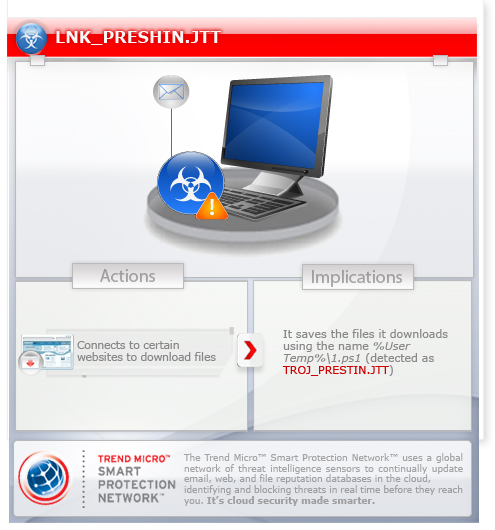LNK_PRESHIN.JTT
Windows 2000, Windows Server 2003, Windows XP (32-bit, 64-bit), Windows Vista (32-bit, 64-bit), Windows 7 (32-bit, 64-bit)


Threat Type: Trojan
Destructiveness: No
Encrypted: No
In the wild: Yes
OVERVIEW
This malware is involved in the attack that was discovered to take advantage of Windows Powershell on May 2014. Victims of this malware may find the security of their systems compromised.
To get a one-glance comprehensive view of the behavior of this Trojan, refer to the Threat Diagram shown below.

This Trojan arrives as an attachment to email messages spammed by other malware/grayware or malicious users.
It executes the downloaded files. As a result, malicious routines of the downloaded files are exhibited on the affected system.
TECHNICAL DETAILS
Arrival Details
This Trojan arrives as an attachment to email messages spammed by other malware/grayware or malicious users.
Download Routine
This Trojan accesses the following websites to download files:
- https://{BLOCKED}mo.net/t/1.ps1
It saves the files it downloads using the following names:
- %User Temp%\1.ps1 - detected as TROJ_PRESHIN.JTT
(Note: %User Temp% is the current user's Temp folder, which is usually C:\Documents and Settings\{user name}\Local Settings\Temp on Windows 2000, XP, and Server 2003, or C:\Users\{user name}\AppData\Local\Temp on Windows Vista and 7.)
It then executes the downloaded files. As a result, malicious routines of the downloaded files are exhibited on the affected system.
NOTES:
It uses Windows Powershell to download and execute the file.
SOLUTION
Step 1
Before doing any scans, Windows XP, Windows Vista, and Windows 7 users must disable System Restore to allow full scanning of their computers.
Step 2
Remove malware/grayware files dropped/downloaded by LNK_PRESHIN.JTT. (Note: Please skip this step if the threats listed below have already been removed.)
Step 3
Scan your computer with your Trend Micro product to delete files detected as LNK_PRESHIN.JTT. If the detected files have already been cleaned, deleted, or quarantined by your Trend Micro product, no further step is required. You may opt to simply delete the quarantined files. Please check this Knowledge Base page for more information.
Did this description help? Tell us how we did.

